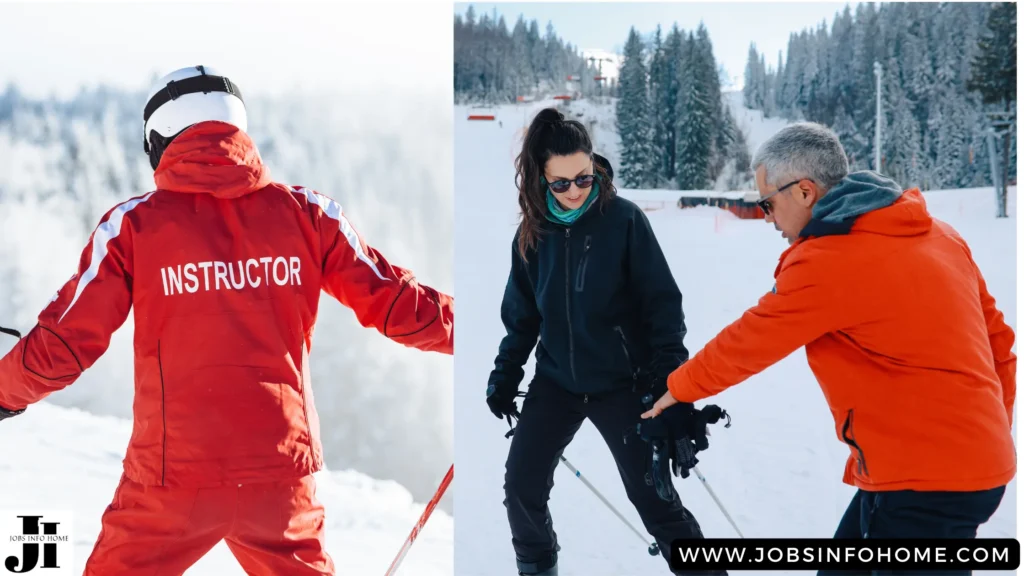If you’re considering a seasonal job, you likely have one question in mind: how long is a seasonal job? Seasonal job offer a chance to explore new fields, earn extra cash, and maybe even travel. But the big question: how long is a seasonal job? In this article, we’ll answer the question “how long is a seasonal job” and provide valuable insights into the benefits, types, and opportunities available in seasonal employment. So, whether you’re a student seeking summer income or a career changer looking for a fresh start, Keep reading to learn more!
How Long Is a Seasonal Job?
Ever wondered, “how long is a seasonal job REALLY going to last?” Unlike your typical year-round position, seasonal jobs have a predetermined time-frame tied to specific peaks in business or industry needs. This time-frame can vary greatly depending on several factors:
- Industry: Some industries experience predictable seasonal variations. Retail explodes during the holiday season, while tourism succeeds during peak travel months. Jobs in these industries typically align with these peaks. For instance, a retail holiday sales associate might expect a position lasting from late October to mid-January, while a park tour guide might work from spring break through summer.
- Location: Seasonal needs can also be geographically specific. Ski resorts in snowy regions might require staff only during winter months (3-4 months), whereas beach lifeguards might be needed year-round in tropical locations, but with increased hours during peak tourist seasons (potentially a longer 6-month stint).
- Company Policy: Some companies have established duration’s for their seasonal positions. For example, a summer camp might hire counselors for a set 8-week program, while a tax preparation firm might need temporary staff strictly during tax season (roughly 3 months).
Here’s a breakdown to give you a general idea:
- Short-term (a few weeks): Perfect for students on break or those seeking a quick financial boost. Examples include concession stand workers at a fair or event staff for a festival.
- Mid-term (2-5 months): A great option for those wanting a focused work experience or travel opportunities. Think summer camp counselors, park rangers during peak season, or seasonal positions at resorts.
- Long-term (up to 9 months): Ideal for individuals seeking a more substantial commitment with the potential to transition into a permanent role. This could be a ski instructor position lasting a whole ski season, or a tax preparer needed throughout the year but with busier tax season hours.
How To Find Seasonal Job?
So, you’re intrigued by the possibilities of seasonal work, but how do you land that perfect position? Here are some tips to find seasonal job:
- Identify Your Interests: Before diving in, consider what excites you. Do you crave an outdoor adventure or prefer a fast-paced environment? Are you drawn to working with people or enjoy independent tasks? Understanding your preferences will help you target industries and positions that align with your passions.
- Control Online Resources: The internet is a treasure trove for seasonal job seekers. Many job boards and company websites specifically list seasonal opportunities. Explore resources like CoolWorks.com, which specializes in connecting individuals with seasonal jobs across the US, or niche job boards focused on your desired industry (e.g., hospitality, tourism, recreation).
- Network Like a Pro: Don’t underestimate the power of your network! Reach out to friends, family, or former colleagues who might have connections in your target field. Let them know you’re seeking seasonal work and inquire about potential opportunities. Social media platforms like LinkedIn can also be valuable tools for connecting with professionals in your desired industry who might have insights into seasonal openings.
- Target Companies with Seasonal Needs: Research companies known for seasonal hiring. Retail giants, resorts, national parks, and even tax preparation firms often require additional staff during peak periods. Look for “careers” pages on company websites or explore social media for seasonal job postings.
- Think Local: Seasonal opportunities aren’t limited to national companies. Consider local businesses like amusement parks, summer camps, or landscaping companies that might have seasonal positions. Get your foot in the door by directly contacting these businesses and expressing your interest in seasonal work.
- Craft a Compelling Resume: Highlight relevant skills and experiences, even if not directly related to the seasonal job. Showcase your adaptability, eagerness to learn, and ability to thrive in fast-paced environments. Tailor your resume for each specific position, mentioning any seasonal work experience you might have.
- Ace the Interview: Be prepared to answer questions about your interest in the specific seasonal role and why you’d be a good fit for the company culture. Express your enthusiasm for the temporary nature of the position and highlight your ability to learn quickly. Knowing “how long is a seasonal job” in this particular role demonstrates your research and commitment.
Popular Seasonal Jobs
While many seasonal jobs fall into the short-term (a few weeks) or mid-term (2-5 months) categories, there are also opportunities for longer seasonal commitments (up to 9 months) that can provide a deeper dive into a particular field and potentially lead to permanent positions. Here are some popular seasonal roles that often fall into this long-term category:

– Ski Instructors (Winter Season – 3-4 Months): If you love winter sports and enjoy sharing your knowledge, becoming a ski instructor offers a fantastic seasonal opportunity. These positions typically last throughout the ski season, providing a chance to hone your teaching skills in a beautiful snowy environment. The longer duration allows you to build rapport with students and colleagues, potentially leading to opportunities for the following season or even a full-time role at the resort.
– Park Rangers (Summer Season – 4-6 Months): Nature enthusiasts can immerse themselves in the wonders of national parks by working as seasonal park rangers. These positions often involve a variety of tasks, from educating visitors and leading hikes to managing campgrounds and enforcing park regulations. The extended summer season allows for in-depth training and a chance to become familiar with park operations, potentially opening doors to future park ranger positions.

– Tax Preparers (Tax Season – Up to 9 Months): Individuals with financial acumen can find long-term seasonal work as tax preparers. While tax season itself is a few months long, some firms require additional staff throughout the year to handle backlogged returns or complex cases. This extended duration provides valuable experience in tax preparation procedures and an opportunity to build a client base, potentially leading to a permanent role within the firm or the chance to establish your own tax preparation practice.
– Tour Guides (Depending on Location – 4-8 Months): Do you have a passion for travel and sharing your knowledge of a particular region? Seasonal tour guide positions can be a great fit. These roles often coincide with peak tourist seasons, lasting anywhere from several months to a full tourist season. The longer timeframe allows you to develop expertise in guiding tours, build relationships with tour operators, and potentially transition into a permanent role within the tourism industry.

– Resort and Hotel Staff (Year-Round with Seasonal Fluctuations – Up to 9 Months): Resorts and hotels often experience significant fluctuations in guest numbers throughout the year. While some positions might be strictly seasonal (e.g., lifeguards at a summer resort), others offer long-term opportunities with busier periods during peak seasons. Working in housekeeping, reservations, or guest services during these extended periods provides valuable experience in the hospitality industry and might pave the way for a permanent role at the resort.
Tips for Making a Seasonal Job Permanent
Seasonal jobs might be temporary by nature, but the impact they have on your career can be long-lasting. Here are some tips to leverage your seasonal experience and potentially transition into a permanent role:
- Shine Bright: From day one, approach your seasonal job with dedication and enthusiasm. Demonstrate a strong work ethic, willingness to learn, and a positive attitude. Make a lasting impression on your supervisor and colleagues, showcasing your value as an employee.
- Seek Out Learning Opportunities: Don’t be afraid to ask questions and take initiative. Volunteer for additional tasks and express your desire to learn new skills relevant to the industry. The longer duration of a seasonal position allows for deeper learning compared to a short-term stint.
- Network Within the Company: Seasonal work provides a fantastic opportunity to build relationships with colleagues and supervisors. Network within the company, express your interest in permanent positions, and keep your name at the forefront. When openings arise, your positive reputation and established connections can give you an edge.
- Highlight Your Achievements: Keep track of your accomplishments during your seasonal role. Did you consistently exceed sales targets? Develop a new training program? Document these achievements and use them to update your resume and showcase your value to potential employers within the company or industry.
- Stay Connected: Even after your seasonal job ends, maintain connections with your colleagues and supervisors. Let them know you’re interested in future opportunities and stay updated on company developments. Social media platforms like LinkedIn are excellent tools for staying connected and expressing your continued interest.
- Apply for Permanent Roles: Don’t wait for opportunities to come to you. Actively research permanent positions within the company or industry you gained experience in during your seasonal job. Leverage the skills you developed and the connections you made to stand out from other applicants.
How Long Does a Seasonal Job Last?
The duration of a seasonal job varies depending on the industry, company, and specific role. While some seasonal jobs may last only a few weeks, others can extend for several months or even a year or more. So, how long is a seasonal job? The answer depends on the specific circumstances.
– Holiday season jobs: Typically last from November to January, coinciding with the holiday season.
– Summer jobs: Usually last from May to September, aligning with the summer season.
– Agricultural jobs: Can last from a few weeks to several months, depending on the crop cycle.
– Winter sports jobs: Typically last from December to April, coinciding with the winter sports season.
Can a Seasonal Job Shape Your Career Path?
A seasonal job may be temporary, but its impact on your career path can be lasting. While the answer to “how long is a seasonal job” varies, the skills, experience, and connections you gain can be invaluable in shaping your future career. Here’s how a seasonal job can influence your career path:
- Gain industry insights: Seasonal jobs provide a firsthand look into a specific industry, helping you decide if it’s a good fit.
- Develop transferable skills: Skills like communication, problem-solving, and time management are valuable in any profession.
- Build a professional network: Connect with colleagues, supervisors, and industry professionals, potentially leading to future opportunities.
- Enhance your resume: A seasonal job demonstrates your work ethic, adaptability, and ability to learn quickly.
- Discover new career paths: A seasonal job can lead to unexpected career opportunities, as you explore different roles and industries.
Also Read: Best Summer Jobs For Teens In 2024
Benefits of Seasonal Work
Sure, you now know that “how long is a seasonal job” depends on various factors. But what makes them so attractive? Here’s why a seasonal job might be the perfect fit for you:
- Boost Your Income: Seasonal jobs often coincide with peak business periods, which can translate to higher pay or bonuses. Retail jobs during the holidays or tourism positions during peak travel seasons are prime examples. This extra income can be a great way to save up for future goals, pay down debt, or simply enjoy some financial flexibility.
- Explore New Careers: Seasonal positions offer a low-risk way to test the waters in a new field. Intrigued by the hospitality industry? Try a seasonal role at a hotel or resort. Curious about working outdoors? Consider a summer job with the National Parks Service. Seasonal work allows you to gain valuable experience and see if a career path aligns with your interests before committing to a full-time position.
- Develop Valuable Skills: Even within a short time-frame, seasonal jobs can equip you with essential skills applicable to various careers. Communication and customer service honed during a retail stint translate well to many professions. Teamwork and leadership skills developed as a summer camp counselor become assets in any collaborative environment. The concentrated nature of seasonal work often leads to accelerated learning and skill-building.
- Travel and Flexibility: Many seasonal jobs offer the opportunity to travel and experience new places. Tour guides, park rangers, and even some remote customer service positions can be location-flexible, allowing you to explore new regions while you work. The temporary nature of seasonal work also provides schedule flexibility, ideal for students on breaks or individuals seeking a change of pace.
- Gain a Competitive Edge: Seasonal work shows initiative and adaptability on your resume. Employers value candidates who can thrive in fast-paced environments and learn quickly. Seasonal experience demonstrates your willingness to step outside your comfort zone and embrace new challenges.
Conclusion
In conclusion, seasonal jobs offer a unique opportunity to gain valuable experience, skills, and connections that can benefit your career in the long run. While the duration of a seasonal job may vary, the impact it can have on your professional journey is significant. By understanding the benefits, types, and opportunities available in seasonal employment, you can make the most of your temporary role and potentially turn it into a permanent position. So, the next time you ask yourself “how long is a seasonal job?” remember that it’s not just about the length of time, but about the value it can bring to your career. Hold the opportunity, work hard, and watch your seasonal job become a stepping stone to success!
Frequently Asked Question (FAQs):
Q1: How long is a season of work?
Seasonal jobs can vary in length, but typically last anywhere from a few weeks to several months, with
most falling between 2 and 6 months.
Q2: What does it mean if a job is seasonal? A seasonal job is temporary work to handle a company's busy times, like retail during holidays or resorts in peak season.
Q3: How long does a seasonal job last Christmas? Christmas seasonal jobs typically last around 3 months, from November to January. This covers the pre-Christmas rush, the holidays, and sometimes into the new year.


2 thoughts on “How Long Is a Seasonal Job?”